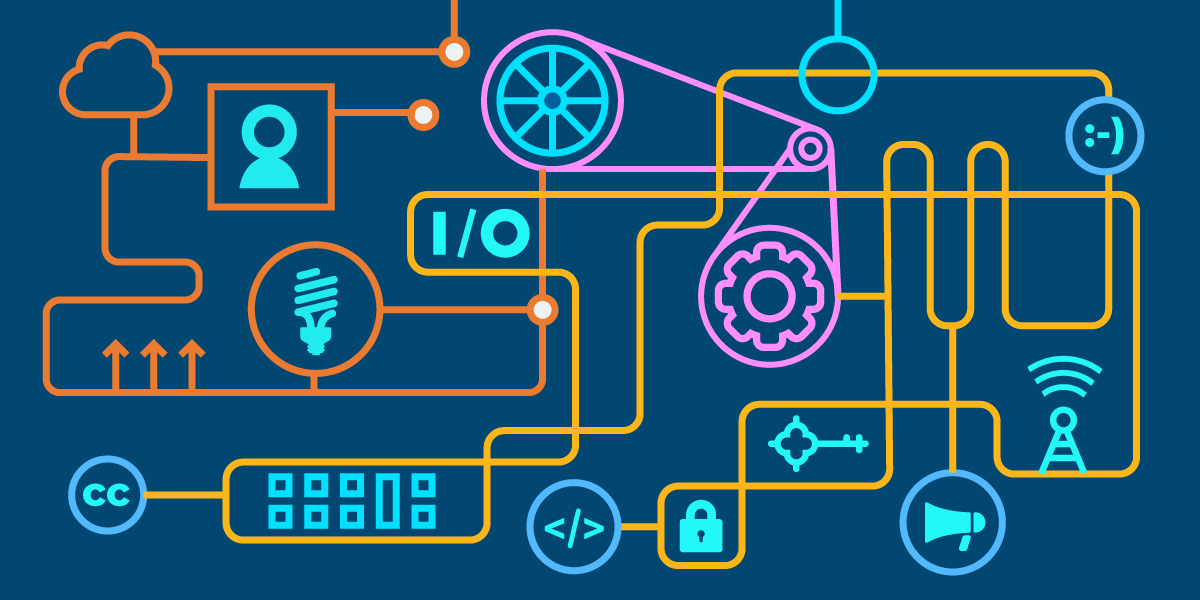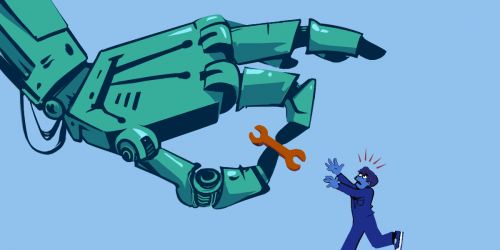Since the earliest days of consumer computing, computer users have asserted their right to have a say in how their tools worked: whether it was Gopher delivering easy new ways to access services that had originally been designed for power users who could memorize obscure addresses and arcane commands; or toolkits like Hypercard and Visual Basic, which let everyday people automate their work; or Scratch, which lets kids design games and apps that come from their imaginations, rather than an app store.
This ability to adapt your tools is especially urgent when those tools are designed by people who live very different lives from your own. The disability rights movement's rallying cry of "Nothing about us without us," crystallizes generations of discontent with the high-handed attitude of distant “experts” who built systems and tools without truly working together with those who use and are affected by them. Technologists are especially notorious for this high-handedness: —like the Honeywell 316, a $10,600 "kitchen computer" for storing recipes that was offered for sale in the 1969 Nieman Marcus catalog. It was designed for women by men, but no women wanted or needed a kitchen computer, and they didn't sell a single one. Despite this ghastly failure, early computer vendors continued to market their wares to women by advertising the ability to store and retrieve recipes.
Even when a tool is useful, its imperfections can chafe and bind users who need to do things the designers didn't imagine or didn't approve of. Scratch a modder or a jailbreaker and you'll often find someone who just wanted the tool that they depend on to do what they need it to do. Since the first neolithic toolmaker chipped away at a stone axe to make it fit her hand, tool-users have also been tool-makers.
The continent of Africa is a vast, complex place, with 54 countries and 1.2 billion residents who themselves live incredibly varied lives in incredibly varied lands. But as different as the lives of Africans are from one another, they are even more different from the lives of the Facebook engineers who oversee WhatsApp, which is the most popular app in much of Africa (in Zimbabwe, half of the data consumption in 2017 was via WhatsApp!).
And despite this incredible popularity, software developers outside America understand that WhatsApp could easily be made better for the users they serve, whose lives and circumstances are much more like their own then they are like the lives of Facebook developers in Menlo Park. These developers have produced a whole bushel of WhatsApp variants, reverse-engineering the official Facebook app and tweaking its features to adapt it for local conditions.
Crucially, these new apps can still interoperate with the official WhatsApp, so users need not choose between using a better WhatsApp and using a WhatsApp that lets them send and receive messages with their friends.
That’s one reason that, as successful as WhatsApp has been in Africa, the made-in-Africa WhatsApp mods are more successful still. The most popular mod, GB WhatsApp, has more active users than Facebook itself! GB WhatsApp allows its users to manage multiple accounts from a single device, to send larger file attachments, to form larger groups, and to mask when they're using the app so that other users can't see that they're active. GB WhatsApp's origins are somewhat mysterious, but it appears that it was first created in Syria at the height of the conflict there, further highlighting how different the lives of users can be from the people who make the tools they depend upon.
These WhatsApp mods are in no way sanctioned by Facebook—indeed, the company actively tracks down and bars users caught using mods (WhatsApp modders advise their users to create burner accounts to use with the mods, which they can simply replace with new burners if they get banned).
WhatsApp mods descend from a reverse-engineering project called libwhatsapp, in which a community of developers created a compatible code-library that makes creating your own WhatsApp mod relatively simple. Libwhatsapp is too widespread for Facebook to censor, but the official GB WhatsApp site fell to legal threats from Facebook in August 2018. Today, users download many "GB WhatsApp" applications from websites and friends, looking for ones that seem reliable and spyware-free. The reliability vacuum left behind by Facebook's legal actions has led to a surge in peer-to-peer sideloading, whereby one friend will directly transmit an app to another – substituting personal trust for trust in websites, stores, or companies. Peer to peer distribution also has the advantage of sidestepping slow, unreliable and expensive mobile data networks. GB WhatsApp continues to see regular updates, though no one is sure who is maintaining the app.
The story of WhatsApp mods is a beautiful illustration of the value of adversarial interoperability: making something new out of an existing product or service, without asking for permission, even when the company whose products you're modifying would really rather you not. Through adversarial interoperability, developers who serve distinct populations with distinct needs can simply make the tools that serve them best, without having to grovel for permission from a giant corporation half a world away. They can put the need of their users—and not the distant corporation's shareholders—first.
Until recently, this kind of adaptation was the norm. Indeed, one of the most famous made-in-Africa technologies is the Ubuntu operating system, envisaged in South Africa and used in rural African schoolhouses far from reliable Internet access or expert technicians who could untangle thorny problems with hardware drivers or application software.
Facebook got its start by taking advantage of adversarial interoperability, creating tools that let its users transfer their address books from established rivals to Facebook when it was a new upstart; making tools to let users of existing social networks retrieve their waiting messages from those services to be read on Facebook; letting users embed previews of pages from existing websites within Facebook's walled garden. The Web was designed to be adaptable in this way: its building blocks, such as the ubiquitous URL, were designed to allow this kind of mixing-and-matching of data, services and interface elements from multiple sources, to create new ones that suited their users better.
Some of adversarial interoperability's staunchest opponents built their fortunes on the practice. For example, John Deere perfected its tractors by sending engineers into the field to see how farmers had modified them, bringing those farmers inventions' back to HQ, patenting them, and incorporating them into future models. Today, John Deere claims that reconfiguring your tractor is a copyright violation, and that anyone who helps farmers do so is committing a felony.
Poor nations have always relied on their ability to modify imports from rich colonial powers to suit their local needs. That's why early American law did not recognize British patents while the nation was industrializing.
African WhatsApp modders are only doing what inventors have always done. The difference is that—unlike in the early days of American independence—African nations are not free to set their own policies on copyright and patent. Instead, they must bow to pressure from the US and other more powerful nations to accept patent and copyright restrictions, whether or not those restrictions makes sense for Africans. As a result, while WhatsApp modders can operate in the shadows, far away from Silicon Valley, they can't export their improved technology to the wealthy world. The laws that prevent adversarial interoperability thus hurt users around the world, and simultaneously enforce a kind of digital colonialism; everyone who isn't lucky enough to work for a tech giant must take what they're given, regardless of whether it suits their local circumstances.
Adversarial interoperability isn't merely a way for the tech industry to remain competitive: it's the key to technological self-determination, the right of every human being to decide which technologies they use, and how.










